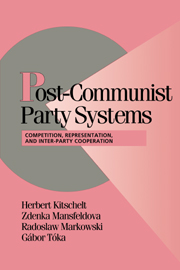Book contents
- Frontmatter
- Contents
- List of Figures and Tables
- Acknowledgments
- Introduction: Democracy and Party Competition
- Part I Theory: Party Systems and the Procedural Quality of Post-Communist Democracy
- Part II Setting and Research Strategy
- Part III The Structuring of Party Competition
- Part IV Political Alignments and Dimensions of Competition
- Part V Political Representation and the Quality of Democratic Governance
- 9 Political Representation
- 10 The Governability of Post-Communist Democracies: Coalition Politics between Passions and Policy Interests
- Conclusion
- Appendix I List of Political Parties and Electoral Alliances
- Appendix II Questionnaire for the Elite Study
- Appendix III Population Survey Questions (Policy Opinions)
- Bibliography
- Index
- More Titles in the series
9 - Political Representation
Published online by Cambridge University Press: 05 June 2012
- Frontmatter
- Contents
- List of Figures and Tables
- Acknowledgments
- Introduction: Democracy and Party Competition
- Part I Theory: Party Systems and the Procedural Quality of Post-Communist Democracy
- Part II Setting and Research Strategy
- Part III The Structuring of Party Competition
- Part IV Political Alignments and Dimensions of Competition
- Part V Political Representation and the Quality of Democratic Governance
- 9 Political Representation
- 10 The Governability of Post-Communist Democracies: Coalition Politics between Passions and Policy Interests
- Conclusion
- Appendix I List of Political Parties and Electoral Alliances
- Appendix II Questionnaire for the Elite Study
- Appendix III Population Survey Questions (Policy Opinions)
- Bibliography
- Index
- More Titles in the series
Summary
If democracies build citizen-elite linkages through programmatic competition, they create feedback loops of accountability and responsiveness that bring about a systematic relationship or even a convergence of the policy positions supported by party representatives in legislatures and their electoral constituencies. If historical legacies shape patterns of representation in the emerging post-communist democracies, such relations are likely to vary across our four East Central European countries. As we have argued in our theoretical chapter, the nature of representative relations varies with the critical dimensions of party competition in each country.
Because of the moderately to highly fragmented party system format and electoral rules of proportional representation, in all four of our democracies parties face disincentives to converge toward the median voter position on critical competitive dimensions. As a consequence, a political divide that has some significance for party competition is therefore unlikely to give rise to relations of moderating trusteeship where party elites take more moderate positions than their constituencies. Instead, on such issue dimensions parties are likely to engage in relations of polarizing trusteeship where political representatives often take more pronounced positions than their constituencies. In terms of the more technical characterization of representative relations proposed in chapter 2, parties emphasize relative representation at the expense of absolute representation, whereas mandate relations of representation combine high relative and absolute representation.
Given communist legacies, trajectories of democratization and competitive dimensions of the party systems, we expect relations of polarizing trusteeship to prevail in the realm of economic policy competition in the Czech Republic, in Bulgaria, to a lesser extent in Poland, and least in Hungary.
- Type
- Chapter
- Information
- Post-Communist Party SystemsCompetition, Representation, and Inter-Party Cooperation, pp. 309 - 344Publisher: Cambridge University PressPrint publication year: 1999



